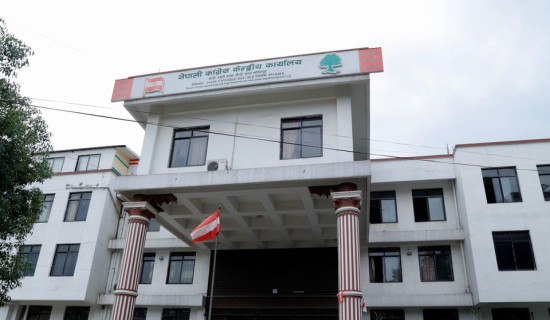- Thursday, 20 November 2025
Crucial Climate Dialogue
As the earth’s temperatures keep rising, mountainous regions are being hit the hardest. Glaciers that have existed for thousands of years are melting rapidly, threatening the vital water sources. Billions of people depend on these water supplies. Fragile alpine ecosystems are being upended by shifts in weather patterns and the arrival of new species. And for the indigenous communities that have called these mountains their home for generations, their traditional ways of life are under unprecedented threat. It is against this backdrop that Nepal is hosting a major international dialogue this week to bring the global attention to the climate crisis faced by mountainous countries. For too long, the specific vulnerabilities and challenges of mountainous countries have been overshadowed in global climate discussions dominated by low-lying island states and coastal regions. While those concerns are valid, there is a risk of the mountain voice being drowned out altogether.
The dialogue provides a vital platform to ensure the mountain climate agenda receives its proper focus on the world stage. Attended by over 200 delegates from 23 countries across Asia, experts will work to forge a united policy vision and coordinate strategies for the pivotal UN climate negotiations in Bonn, Germany next month. With mountain nations comprising over one-fifth of the world’s countries and landmasses, it is critical that their interests are forcefully represented. Nepal is a perfect place to host such an event. As a poor but environmentally aware country in the Himalayan range, its people see the effects of melting glaciers, rising temperatures, and extreme weather up close. Kathmandu has the moral authority to raise these issues in front of the broader international community. It would help to push the international community to take real action.
However, beyond articulating the scale and urgency of the challenge, this dialogue must produce tangible commitments to solutions. Developing robust scientific research, scaling adaptation measures, mobilising climate finance, and promoting clean energy alternatives must all be priorities. The existential threat is clear: by 2050, the Himalayan warming trend could surpass 1.8 degrees Celsius, potentially melting two-thirds of the region’s glaciers within decades. But framing mountains solely as environmental victims would be a mistake. The discourse must recognise the indispensable role that healthy mountain systems play in persuading all life on earth through vital ecosystem services like water storage and regulation.
Mountains quite literally make modern civilization possible — a reality that should spur wealthy nations to do far more to support vulnerable mountain communities on the front lines through aid, technology transfers, and capacity building. The meet needs to significantly enhance the negotiating leverage of mountain nations within the UN climate process going forward. For too long, their unique perspectives and policies have been overshadowed by larger geopolitical interests. The roadmap and strategy emerging from Kathmandu this week must aim to elevate the mountain agenda as a core pillar of future UN climate agreements and commitments. The fate of the world's great mountain ranges epitomises the frontline of the climate crisis. Ascending their highest peaks for recreation may soon become a pursuit relegated to history.
More critically, millions of people who depend on these fragile environments for their livelihoods and cultural heritage face the imminent risk of displacement from their ancestral lands. Mountains have inspired awe and wonderment in all who behold their towering majesty. It would be an injustice if human-induced climate change rendered them barren, windswept ruins in our lifetimes. This week’s dialogue must be a wake-up call for the world to do more to preserve these vital ecosystems before it is too late.

















